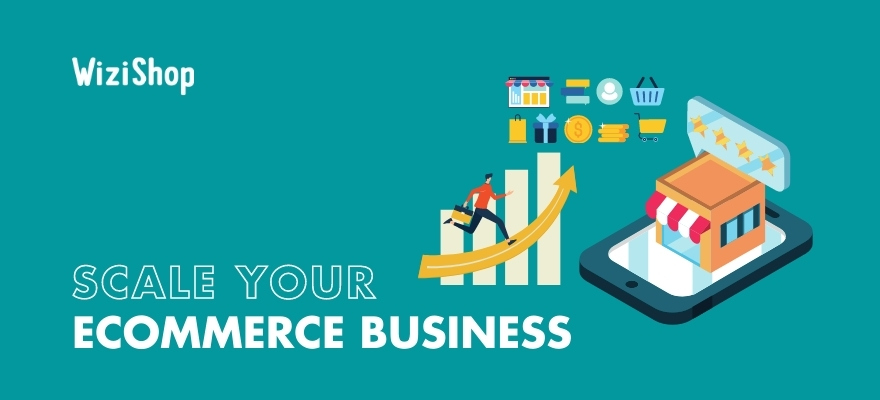Is your ecommerce site as profitable as it could be? Whether the growth of your business has stagnated or you want to maintain its solid rate of growth, scaling your business is the key to its future success.
You may wonder if your ecommerce site has reached the pinnacle of its earning potential. If it indeed has, making the effort to scale your company would seem pointless.
The good news is that global ecommerce retail sales are projected to reach $8.1 trillion (USD) in 2026, according to data from Statista. This is up from the $5.2 trillion (USD) achieved in 2021.
What does this mean for your ecommerce store? Don’t worry! There’s plenty of room for your brand to grow in market share and profitability.
You simply need to be ready to seize the opportunities that present themselves and ensure that you’re able to adjust and manage your ecommerce site accordingly. In addition, don’t be afraid to make a few of your own opportunities too!
How to scale your ecommerce business
While there may be a small element of luck and timing involved in starting a successful ecommerce business, growth is something that takes ample planning and intentional effort. Your business must have all of the infrastructure and processes in place so that expansion is not stymied.
Scaling your ecommerce business enables you to optimize all of your current efforts. For example, it allows you to squeeze all of the benefits out of the organic and paid traffic that you’re driving to your website today.
Although scaling your ecommerce store is easier said than done, the following steps will help to start your company on the right path.
1. Develop a strong marketing strategy
Your ability to reach and to entice your target audience is a foundation for scaling your business. Each ecommerce store has unique product offerings and appeals to its own customers.
For this reason, there isn’t a universal marketing strategy that’s a best-fit plan for all situations. However, there are a few go-to strategies that you might want to include in your ecommerce marketing checklist.
For example, a solid marketing strategy may involve a combination of special offers or other incentives for people visiting your store. Coupons, promotional offers, and even product freebies could work well in some situations.
As you develop or refine your marketing strategy, consider who your customers are, what drives them, and the logistics of connecting with them. It’s advantageous for your chosen ecommerce platform to offer technology that enables you to email store visitors who abandon items in their online shopping carts.
For instance, when you create your online store with WiziShop, you’ll have access to all kinds of free tools, including an emailing solution called Auto-Mail Booster. You’ll find that this handy tool allows you to customize email content, program automatic email follow-ups (such as for abandoned carts), and more.
Social media platforms offer additional effective ways to reach established customers who follow your business. They can also help you to get new customers for your ecommerce business through sharing and paid advertisements or promotions.
While Facebook and Twitter may have broad appeal, other platforms may be more effective at reaching people in niche audiences. Understanding your audience and the reach of each platform can help your brand to start optimizing social media marketing.
2. Build your customer email list
Driving targeted traffic to your ecommerce site organically takes a considerable amount of time and effort. Paying for traffic eats into your business’s profits.
Because of these two factors, a critical aspect of scaling involves optimizing the value of every visitor to your website. One effective way that this is done is through a customer email list.
When you create a customer email list, the data you obtain allows you to remain directly in touch with visitors who have opted into your campaigns. It can take a long time to build a list organically, so your website needs to have an email collection form or popup request today.
You may entice people visiting your site to sign up by offering a one-time discount or another special offer. When you develop your email marketing campaigns, ensure that each correspondence delivers true value and be sure that your emails don’t foster irritation.
3. Increase your customer support efforts
As your business grows and customer base expands, your store will be faced with an increasing need to support those customers. After all, they’ll inevitably have questions, concerns, and (hopefully only occasional) complaints.
You may only field a few customer service calls daily right now, but this number can grow exponentially. The ability for your customers to receive friendly, helpful service is essential, and don’t let it suffer because of your business’s internal growing pains.
If you start to slack on customer service, you may find your product sales declining very quickly.
While some aspects of customer support can be automated, you must have infrastructure in place to respond to inquiries personally as well. You’ll want to minimize costs while continuing to provide your customers with excellent service.
When you start to scale your business, you may want to explore the cost and benefits of outsourcing customer support to a trusted third-party provider.
If your company’s going to keep customer support in house, improving the operational efficiency of your customer support team is essential. Consider utilizing email and chat services and tools to provide alternatives to phone calls.
Many of your company’s customers will love the flexibility. In addition, your customer service team may work more efficiently when these communication methods are added.
Whether your customer support is outsourced or it’s managed internally, a well-defined customer service policy is essential. Establish now to handle complaints, and develop a clear return/exchange policy.
Lastly, don’t make these policies difficult to locate on your website. Your brand’s policies can dramatically reduce inquiries and negative feedback when you’re trying to scale your business.
4. Optimize SEO
There’s no way around the fact that your ecommerce business needs to create an effective search engine optimization (SEO) strategy in order to remain competitive. Although SEO drives organic traffic, it doesn’t work magic overnight.
It can take at least 6 months for a well-designed SEO strategy to start showing results. If your company’s strategy isn’t effective, it can take you that long to learn that adjustments are needed.
There are numerous steps that you can take now to help optimize your website when you want to scale your business. These include improving page load speed, establishing solid internal links, building external links, and taking advantage of alternative text, meta tags, and more.
Best practices for SEO change frequently, as Google’s algorithms are updated. For this reason, as you scale your business, you should continuously make an effort to stay on top of these changes or work with a trusted web developer who’s familiar with SEO marketing.
Note that when you create an online store on the WiziShop platform, you won’t have to worry about the technical elements of SEO for your site. We’ve got you covered there!
Try WiziShop free for 7 days
THE EASIEST NO-CODE ECOMMERCE SOLUTION✅ No credit card required
✅ Access to all features
✅ No commitment
5. Capitalize on user-generated content
Not all of the online content related to your business or your products needs to come from you. Your customers can produce their own YouTube videos and other types of content to tout various aspects of their experience.
The unique benefit of user-generated content is that it gives your audience a real-life view of what they can expect if they purchase a product from your business. This can help boost customer trust, which in turn may increase sales for your store.
Inspiring your customers to post content about your business or working with social media influencers to advertise your product can be tricky. Some businesses have found success by offering freebies or discounts to those who make posts on their social media platforms.
The right inspiration for your situation will depend on your website’s offerings and your target audience.
6. Add customer reviews to your website
If your ecommerce website isn’t currently set up to collect customer reviews for products, now is the time to tweak it. Because many of today’s online shoppers read reviews about products, reviews have the power to directly improve your conversion rate. Likewise, off-site reviews about your business are equally relevant.
A step up from customer reviews is a personal referral. While some satisfied customers will be happy to tell their friends and family members about their great experiences with your business and products, others may need an incentive.
The power of a personal recommendation from someone who is known and trusted is tremendous. Adding an incentive to your referral program may therefore more than pay for itself over time with the increase in sales that you’ll see.
While you may hope for positive reviews, almost every product or business will have at least a few negative comments. The time to prepare for these comments is before you read them.
Establish a public relations policy so that can properly address these issues and mitigate the fallout. When a business responds positively to negative press, it can dramatically improve public image.
7. Use Google to increase traffic
Google’s benefits to your ecommerce business extend far beyond placement on search engine results pages.
For example, you can get your products directly in front of customers through Google Shopping ads. You can also take advantage of pay-per-click campaigns and other Google advertising options.
Google continues to evolve, and its ability to connect your target audience with you is increasing. Everything from Google My Business to Google Analytics and its page load analyzer can help you to improve your website’s visibility and effectiveness in various ways.
8. Automate where you can
When you aim to scale your ecommerce business, your goals are to maximize growth and profits while conserving your time, energy and resources. An essential component to this is automation.
Your business’s growth is limited by what you put into it. Your personal resources are understandably limited, so automation is key.
The automation solutions available to ecommerce businesses are incredible. For example, software is available to automate repricing, feedback, fulfillment, and more. An important byproduct of automation is that your business will appear more professional to your customers.
9. Use a third party to fulfill orders
Filling orders may be one of the best parts of the day. After all, packaging and shipping goods is a visualization of profits and success.
However, fulfilling orders requires you to print invoices and shipping labels, package the products, maintain shipping supplies and more. These are time-consuming tasks that can be handed over to a third party when your business expands
Paying someone else to handle order fulfillment can seem like a waste of money initially, but this is a critical step in scaling your online business. This is because it frees up a substantial amount of time and resources that will be needed in other areas as your business grows.
Looking ahead
Running an ecommerce website can consume the better part of your day, so finding time and energy to focus on scaling is challenging. However, growth potential is severely capped if you don’t plan for and encourage growth in essential ways.
Your business is unique, so carefully consider how these tips and insights can be applied to your business model.
Remember that scaling your ecommerce website is not something that you can simply cross off of your to-do list. Your business will continue to grow and evolve.
At the same time, technologies will be introduced, your customer base may change, and other relevant factors will come into play. To optimize growth and profits going forward, you must constantly look for opportunities to improve processes and strategies.










